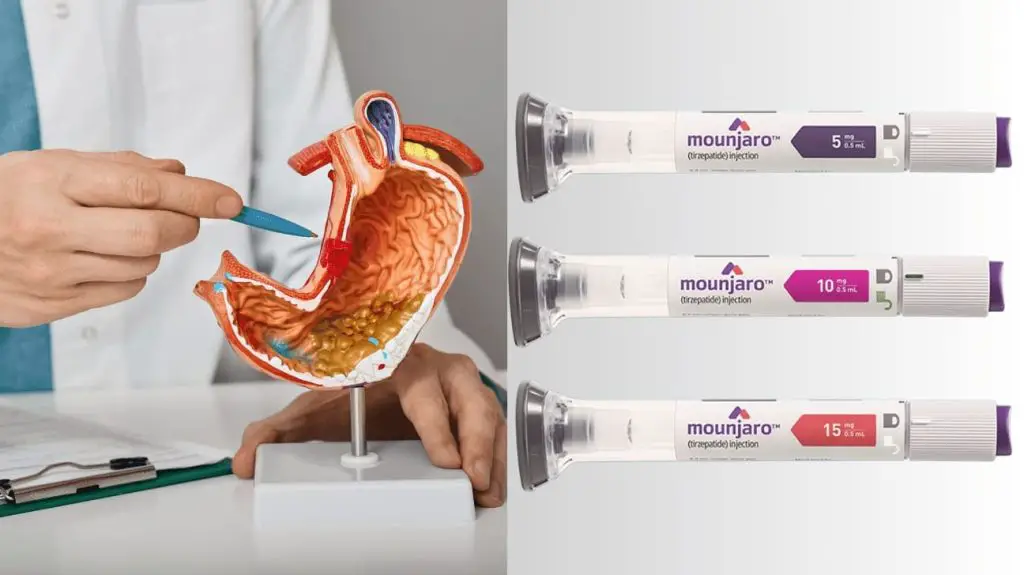Mounjaro and Gastric Bypass: Unveiling Weight Management
Ever wondered about the science, side effects, and secrets behind these powerful obesity-fighting tools?
Join us on this journey to discover the facts and step into a healthier, fitter future!
Mounjaro and gastric bypass

The FDA has approved Mounjaro, a once-weekly injection, for use in individuals with type 2 diabetes to decrease blood sugar levels.
This treatment should complement a healthy diet and regular exercise.
Mounjaro, also known as Tirzepatide, stands out as the first dual GIP/GLP-1 receptor agonist.
This means it targets both glucose-dependent insulinotropic polypeptide (GIP) receptors and glucagon-like peptide-1 (GLP-1) receptors.
Roux-en-Y gastric bypass, commonly known as gastric bypass, is a weight-loss surgical procedure.
It involves the creation of a small pouch from the stomach, which is then directly connected to the small intestine.
- After undergoing this surgery, the food you consume will pass into this small stomach pouch
- And then directly into the small intestine.
- This process bypasses a significant portion of your stomach and the initial part of your small intestine.
- The primary purpose of gastric bypass surgery is to facilitate significant weight loss.
- And decrease the risk of potentially life-threatening health issues related to excess weight.
These include:
- gastroesophageal reflux disease,
- heart disease,
- high blood pressure,
- high cholesterol,
- obstructive sleep apnea,
- type 2 diabetes,
- stroke, cancer, and
- infertility.
- Related: Dose of mounjaro for weight loss
How is gastric bypass different from Mounjaro?
Gastric bypass and Mounjaro represent two distinct treatment approaches.
The former, a surgical procedure, aids weight loss by altering how the stomach and small intestine process food.
Conversely, Mounjaro, a medication, works to lower blood sugar levels in adults diagnosed with type 2 diabetes.
Although clinical trials have demonstrated Mounjaro’s potential for facilitating weight loss, the FDA has yet to officially approve it as a weight loss drug.
- Related: Can mounjaro help with weight loss
Can I Take Mounjaro after gastric bypass?
There are no studies yet on the use of Mounjaro for weight regain or sub-optimal weight loss after bariatric surgery.
However, there are studies that show that other GLP-1 agonists are safe and effective for patients after bariatric surgery.
It’s important to note that both Mounjaro and gastric bypass surgery have potential side effects and risks.
So, it’s better to consult your healthcare specialist before jumping on it.
- Related: Does mounjaro affect libido?
What are the benefits of Gastric Bypass surgery?
For those grappling with obesity, gastric bypass surgery can offer a multitude of benefits.
These may include-
- substantial weight loss,
- mitigation, or
- even resolution of obesity-related health issues like type 2 diabetes,
- high blood pressure, and sleep apnea.
Additionally, it can enhance mobility and physical activity, boost self-esteem, and improve the overall quality of life.
However, it’s crucial to remember that gastric bypass surgery is a significant procedure with both risks and benefits.
Therefore, a thorough discussion with a competent healthcare professional is essential before deciding whether this surgery is the right choice for you.
Different weight loss surgeries
There are several types of weight loss surgeries.
Here are some of them:
1. Gastric bypass surgery:
- In this procedure, surgeons create a small pouch from the stomach
- And reroute the small intestine to this new pouch.
- This modification restricts your food intake and decreases the calories and nutrients your body can absorb.
2. Sleeve gastrectomy:
- This operation involves the removal of a significant part of your stomach.
- Leaving behind a small, sleeve-like structure.
- This change limits your food intake and reduces the number of calories your body can absorb.
3. Adjustable gastric banding:
- In this procedure, surgeons place an inflatable band around the upper part of your stomach,
- Forming a small pouch above the band.
- This modification restricts your food intake and promotes a quicker feeling of fullness.
4. Biliopancreatic diversion with duodenal switch:
- This surgery involves removing a large part of your stomach
- And rerouting the small intestine to the newly formed pouch.
- This change limits your food intake and reduces the number of calories and nutrients your body can absorb.
Does Gastric Bypass Work For everyone?
Gastric bypass surgery can help a lot of people lose weight and improve their health, but it doesn’t work for everyone.
A lot of things depend on how well this process works.
These include the person’s commitment to making changes to their lifestyle, like-
- eating well and working out regularly,
- as well as their general health and medical history.
Will Gastric Bypass work if someone is on Mounjaro medication?
Currently, no evidence indicates that taking Mounjaro medication would influence the outcomes of gastric bypass surgery.
Gastric bypass surgery, a procedure-
- that aids weight loss by modifying how the stomach
- and small intestine process food, operates differently in Mounjaro.
The latter is a medication designed to lower blood sugar levels in adults living with type 2 diabetes.
Can you take diet pills after gastric bypass surgery?
Doctors advise against taking any extra supplements or diet pills post-gastric bypass surgery that they haven’t prescribed.
Adhering to the dietary guidelines-
- your healthcare provider gives you after the surgery,
- is crucial to maintaining proper nutrition and preventing complications.
If you’re contemplating using diet pills after the surgery, it’s vital to consult your doctor.
Tell me about the effect of Weight loss surgery on health
Weight loss procedures like gastric bypass can profoundly influence a person’s health.
They assist individuals in shedding substantial weight-
- which can lead to the improvement or
- even resolution of numerous obesity-related health issues,
- including type 2 diabetes, high blood pressure, and sleep apnea.
- Beyond these physical health advantages,
- weight loss surgery can also boost mental health by enhancing self-esteem and overall life quality.
- However, it’s crucial to remember that weight loss surgery is a significant procedure with both risks and benefits.
What is the safest weight loss surgery?
Every surgical procedure carries a certain level of risk, but numerous noninvasive options exist in the realm of weight loss surgery.
A comprehensive study conducted in 2018 evaluated the safety and effectiveness of various bariatric surgeries, involving over 250,000 participants.
- The study’s findings revealed that among the three prevalent surgical weight loss procedures,
- gastric sleeve surgery emerged as the safest, presenting the lowest risk of side effects.
However, the safety of weight loss surgery hinges on several factors-
- such as the individual’s health,
- the type of surgery, and
- the surgeon’s skill level.
FAQs: Mounjaro and Gastric bypass
What medications are off limits after gastric bypass?
Some medications that are off limits after gastric bypass include nonsteroidal anti-inflammatory drugs (NSAIDs), aspirin, and ibuprofen. These medications can cause ulcers and other complications.
Can you take Ozempic if you’ve had gastric bypass?
Yes, you can take Ozempic if you’ve had gastric bypass. However, it’s important to consult with your doctor or healthcare provider before taking any new medication.
Can you take weight loss meds after gastric bypass?
Yes, you can take weight loss medications after gastric bypass.
What happens if you get fat again after gastric bypass?
If you regain weight after gastric bypass, it could indicate a need for dietary adjustments, increased physical activity, or in some cases, additional surgery.
What happens when you stop Mounjaro?
If you stop taking Mounjaro, your body will no longer receive the medication’s benefits.
Final thoughts
Mounjaro and gastric Bypass surgeries offer unique and effective approaches to managing obesity.
While medications like Mounjaro can help regulate blood sugar levels and potentially aid in weight loss, procedures like gastric bypass surgery provide a more direct method of weight control by altering the digestive system.
However, the success of these methods depends on individual commitment to lifestyle changes and overall health.
If you found this information helpful, please share this post and stay tuned for more health and wellness insights.
Cheers!
